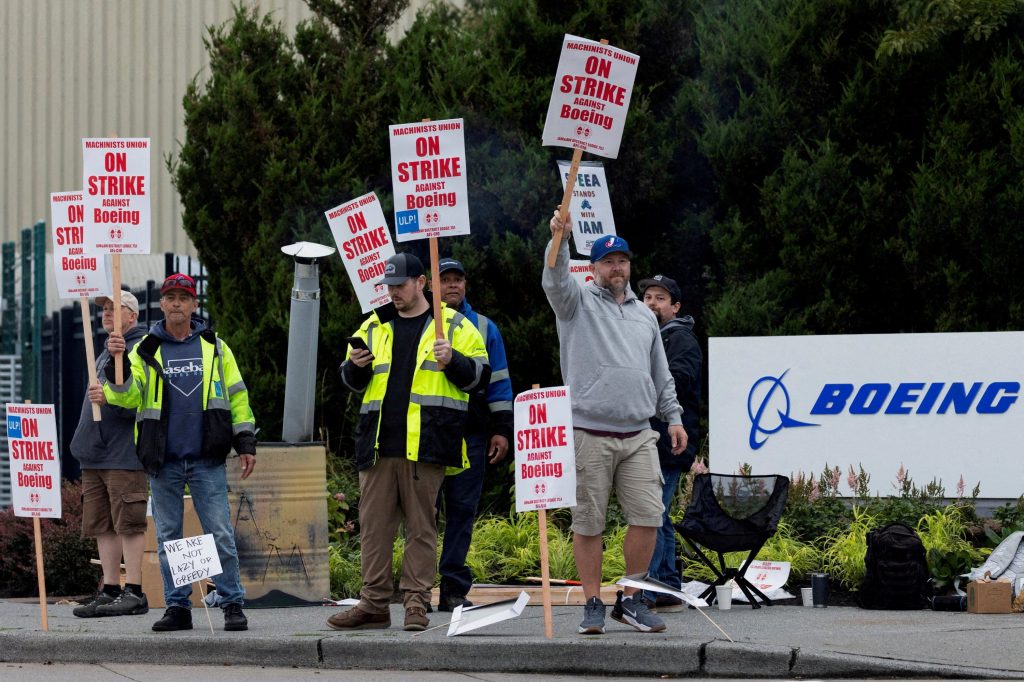Boeing strikers not interested in 30% pay rise – union
3 min read

The union representing thousands of striking Boeing workers has announced that a recent survey indicates its members are “not interested” in the company’s latest pay proposal. The International Association of Machinists and Aerospace Workers (IAM) expressed disappointment with Boeing’s offer, stating that many comments from members deemed the proposal inadequate.
This announcement follows Boeing’s new offer to workers, which proposed a substantial 30% pay increase over four years. The IAM’s reaction underscores a growing tension between the union and the aerospace giant as negotiations continue. The union emphasized that the survey results were “overwhelmingly clear,” indicating that members were uninterested in the offer that had been circulated through the media.
Boeing’s proposal, characterized as its “best and final” offer, included the reinstatement of a performance bonus, enhanced retirement benefits, and a one-time signing bonus of $6,000 (£4,470) for workers who agree to the new deal. However, the company stipulated that this offer must be ratified by union members by midnight Pacific time on Friday, September 27 (7:00 GMT on Saturday, September 28).
The IAM expressed concern over Boeing’s approach to communicating the offer, claiming that the company had sent the proposal directly to union members and the media without informing the IAM representatives first. Furthermore, the union argued that the deadline set by Boeing did not allow sufficient time to organize a vote among its members.
In response, Boeing refuted the IAM’s claims, asserting that it had indeed notified union representatives about the offer. The company stated it would provide the IAM with additional time and logistical support to facilitate a vote among the workers.
Since the strike began on September 13, more than 30,000 Boeing workers have walked off the job after rejecting an earlier 25% pay rise offer. These workers are involved in producing aircraft, including the 737 Max and 777, and they voted overwhelmingly in favor of strike action until a satisfactory agreement could be reached.
Initially, the IAM had aimed for more substantial improvements to workers’ compensation packages, including a 40% pay increase. The ongoing strike poses a significant threat to Boeing’s financial stability, potentially costing the company billions of dollars amid an already challenging operational environment. Boeing has been grappling with various issues, including supply chain disruptions and production delays, further complicating the situation.
The striking workers are demanding not just higher wages but also better working conditions and benefits, highlighting broader concerns within the aviation industry about fair compensation and employee treatment. As the strike continues, both sides remain at an impasse, with the union insisting on a more favorable deal that meets the needs of its members.
With the deadline for Boeing’s offer fast approaching, the pressure is mounting on both the company and the IAM. As negotiations unfold, the potential for a prolonged strike looms, which could exacerbate existing challenges for Boeing, already facing operational setbacks and a tarnished reputation in the aerospace market.
In summary, the IAM’s survey results indicate a clear rejection of Boeing’s latest pay offer, emphasizing the union’s determination to secure a deal that aligns with workers’ expectations. As the deadline nears, the situation remains fluid, with significant implications for both Boeing and its workforce. The outcome of these negotiations will not only affect the immediate future of the striking workers but could also set a precedent for labor relations within the aviation industry as a whole.